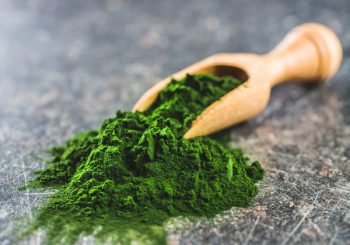Contributing writer for Wake Up World
You may have heard about chlorella because it’s being added to various health products. Its name is derived from a combination of two Greek words: “chloros” (green) and “ella” (small).1 If you’re curious about what chlorella actually is and how you can use it to your advantage, keep reading this article.
[pro_ad_display_adzone id=”110028″]
What is chlorella supplement?
Chlorella is sourced from a single-celled freshwater algae called Chlorella vulgaris.2,3 Manufacturers typically process the chlorella to break down its cell walls so its nutrients will become available.4,5 One particular substance that can be derived from this microalgae is a water-soluble extract6 called chlorella growth factor or CGF,7 which contains amino acids, peptides, vitamins and minerals.8
The algae often used to make chlorella powder, tablets or liquid extract9 is grown in farms in Japan or Taiwan.10 However, take note that chlorella shouldn’t be confused with spirulina. While both are algae, they differ in color. Chlorella is green, while spirulina has a blue-green hue.11
Chlorella mainly binds to heavy metals12 and helps detox the body,13 while also providing other benefits (more of this to come later). Meanwhile, spirulina is a “complete protein”14 that possesses minerals such as iron, calcium, magnesium and potassium15 and is a valuable source of gamma-linolenic acid.16 Studies have also suggested that spirulina may help fight allergies17 and boost immunity.18
Health benefits of chlorella
Chlorella has been labeled a “superfood”19 because it contains these vital nutrients:
- Chlorophyll20 — It may aid in protecting your body against infections,21 alleviating constipation,22 promoting optimal blood pressure levels,23 cleansing your liver and your blood and removing molds.24
- Antioxidants such as lutein, alpha-carotene, beta-carotene, ascorbic acid and zeta-tocopherol — Chlorella extract may promote free radical-scavenging capabilities in rats induced with a chemical called naphthalene, according to results of this 2007 Molecular and Cellular Biochemistry animal study.25
- Other nutrients — Chlorella is home to essential nutrients such as vitamin K,26 vitamin B12, folate, iron,27 omega-3 polyunsaturated fatty acids, polysaccharides and proteins.28
Extensive research has also linked chlorella to multiple health benefits. This microalgae may help:
- Detoxify the body — Studies have shown that chlorella may help eliminate heavy metals and pathogens from your body.29,30
- Boost the immune system31 — Chlorella supplements may help reduce the risk for immune system disorders and improve immune system function.32
- Improve quality of life among people diagnosed with breast cancer — Subjects with breast cancer who took chlorella and chlorella extract experienced less instances of fatigue and noticed improvements to dry skin.33
- Normalize blood sugar levels34 — Chlorella supplements were effective in addressing insulin sensitivity among rat subjects, which shows its potential in improving blood sugar levels among people struggling with insulin resistance.35
- Regulate blood pressure levels — Chlorella supplements are abundant in the neurotransmitter gamma-aminobutyric acid (GABA), which assists in lowering high to normal blood pressure levels in study subjects.36
- Manage cholesterol levels — In a 2014 Nutrition Journal article, researchers found out that chlorella supplements helped decrease triglyceride and total cholesterol levels among subjects with hypercholesterolemia.37
- Counteract the negative effects of oxidative stress38 — Chlorella extract helped protect rats’ bodies against liver injuries and other oxidative stress-induced changes in the body.39
- Contribute to healthy brain function40,41 — Because chlorella can combat oxidative stress, this supplement may not just enhance brain function, but also reduce risk for cognitive decline.42
- Promote better metabolism43,44 — Chlorella may prompt changes to genes that influence your insulin signaling and how fat is metabolized in your body.45
What else is chlorella used for?
According to WebMD, chlorella may be recommended to stimulate good bacteria production within your gut, and possibly assist in addressing skin lesions,46 ulcerative colitis, Crohn’s disease, diverticulitis and trichomoniasis (a sexually transmitted disease). Chlorella may also help:47
- Reduce risk for adverse effects caused by chemotherapy or radiation treatment
- Increase amounts of white blood cells in people with HIV or cancer
- Address premenstrual syndrome (PMS) and ease fibromyalgia
- Combat bad breath
- Alleviate inflammation that may be a precursor for asthma attacks48
Studies on chlorella
Chlorella has been the subject of various studies for many years, and researchers concluded that it may be useful against certain diseases or conditions, such as:
- Liver cancer — A 2009 Journal of Zhejiang University Science B study revealed that chlorella vulgaris extract inhibited the development of tumors and triggered apoptosis or cell death in liver cancer-induced rats.49
- Hepatitis C virus (HCV) genotype 1 — A 2013 study found that people with chronic hepatitis C infection were able to tolerate chlorella supplements and had decreased ALT liver enzyme levels.50
- Digestive disorders like diarrhea — In this February 2017 Animal article, chlorella and spirulina supplements led to good intestinal health among weaned piglets, helping alleviate digestive issues like diarrhea.51
What to look for in a chlorella supplement
If you want to take chlorella supplements, make sure that it is broken cell wall chlorella, since this type of product is the only form that allows your body to reap this algae’s nutrients. Ideally, purchase chlorella supplements produced by a trustworthy manufacturer, and ensure that:
- It’s labeled as broken cell wall chlorella (so it can be digested properly).
- It’s organic and doesn’t contain synthetic ingredients.
- The product was extensively tested for its quality.
Chlorella side effects to watch out for
When taking any form of chlorella for the first time, do it gradually. Even if you believe you’re healthy, you need to start the process slowly because taking chlorella supplements can make you feel slightly unwell. Minor side effects that may occur include:52
- Diarrhea
- Nausea
- Gas
- Stomach cramping
- Green color in bowel movements
- Sensitivity to the sun — This can be alleviated by restricting your time in the sun to a few minutes at a time, and by wearing a broad-brimmed hat and light clothing with sleeves whenever you go out.
Seek medical attention immediately if you develop breathing problems or allergic reactions after taking chlorella supplements.53 WebMD further advises avoiding chlorella, unless approved by your physician, if you are:54
- Pregnant or breastfeeding
- Taking anticoagulant medicines like warfarin, as chlorella’s vitamin K content may reduce their effect55
- Dealing with a compromised immune system, since chlorella may increase the amounts of bad bacteria in your gut and trigger reactions
- Sensitive to iodine, an element found in chlorella. It can trigger an allergic reaction
- Allergic to mold
On a final note, remember that chlorella may contain iron.56 While levels of this mineral in women aren’t usually problematic because menstrual cycles cause frequent iron loss, excessive quantities are usually found in men and postmenopausal women. This may lead to health problems like iron overload, meaning you need to regularly monitor your blood iron stores, particularly your serum ferritin and GGT levels. Take note of the following ideal amounts:
- Ferritin — 30 to 40 nanograms per milliliter (ng/mL) or 75 to 100 nanomoles per liter (nmol/L) for adult men and non-menstruating women
- GGT — Below 16 units per liter (U/L) for men, or below 9 U/L for women
If your iron levels are higher than the ideal recommendations, this may be problematic and should be addressed by either foregoing chlorella supplementation or by undergoing blood donations two to three times a year or via regular phlebotomies.
Frequently asked questions (FAQs) about chlorella
Q: Is chlorella a microalgae?
A: Yes. Chlorella is sourced from a single-celled water algae57 that’s typically grown in Japan and in Taiwan.58
Q: How does chlorella reproduce?
A: This type of algae undergoes asexual reproduction. According to the Encyclopedia Britannica, chlorella reproduction occurs when autospores or nonmotile reproductive cells breach into a “mother cell.”59
Q: What are the vitamins and minerals found in chlorella?
A: Chlorella contains vitamin K60 and B12, iron and folate.61
Sources and References:
- 1 MOJ Food Process Technol 2018, 6(2): 00144
- 2, 57 ACS Appl. Mater. Interfaces201573218104-18112
- 3, 5, 9, 19 MedicalNewsToday, November 18, 2017
- 4, 13 Alternative and Complementary Therapies. Jun 2001. Volume: 7 Issue 3: July 5, 2004
- 6, 8, 10, 20, 52, 54, 58 WebMD, “Chlorella”
- 7 Journal of Applied Phycology. 30. 1-11
- 11 J. Algal Biomass Utln. 2012, 3 (4): 89–100
- 12, 29 ScientificWorldJournal. 2013; 2013: 219840. Published online 2013 Apr 18
- 14 Nutr Hosp. 2015;32(1):34-40
- 15 Journal of Agroalimentary Processes and Technologies. 20. 330-350
- 16 Journal of Applied Biotechnology Reports. 3. 483-488
- 17 ISRN Allergy. 2013 Nov 13;2013:938751
- 18 Cell Mol Immunol. 2011 May; 8(3): 248–254. Published online 2011 Jan 31
- 21, 31 Nutr J. 2012 Jul 31;11:53
- 22 WebMD, “Chlorophyll”
- 23 Akademik G?da 9(2) (2011) 26-32
- 24 Akademik G?da 9(2) (2011) 26-32, p. 29
- 25, 38 Mol Cell Biochem (2007) 303:39–44, p. 40
- 26, 55, 60 Rinsho Shinkeigaku. 1995 Jul;35(7):806-7.
- 27, 56, 61 Journal of Pharmacy and Nutrition Sciences, 2011 Vol. 1, No. 2, p. 115
- 28 Curr Pharm Des. 2016;22(2):164-73
- 30 Int Immunopharmacol. 2003 Jun;3(6):889-900
- 32 Nutrients. 2017 Jul 6;9(7). Published online 2017 Jul 6
- 33 Evidence-Based Complementary and Alternative Medicine, vol. 2014, Article ID 704619, 7 pages, 2014
- 34 Life Sci. 2006 Feb 9;78(11):1181-6. Epub 2005 Nov 14
- 35 Phytother Res. 2011 Sep;25(9):1306-12. doi: 10.1002/ptr.3379. Epub 2011 Feb 10
- 36 Clin Exp Hypertens. 2009 Jun;31(4):342-54
- 37 Nutr J. 2014 Jun 11;13:57
- 39 In Vivo. 2009 Sep-Oct;23(5):747-54
- 40 Psychoneuroendocrinology. 2016 Mar;65:1-8
- 41 Journal of Health Science, 2011, 57 (2011) 3 p. 245-254
- 42 Neuroscience Letters, Volume 464, Issue 3, 30 October 2009, Pages 193-198
- 43 Annals of the New York Academy of Sciences, 1171: 183–189
- 44 Obes Res Clin Pract. 2013 Mar-Apr;7(2):e95-e105
- 45 J Med Food. 2008 Sep;11(3):395-404
- 46 Int J Mol Sci. 2015 Sep; 16(9): 21021–21034. Published online 2015 Sep 2
- 47, 53 WebMD, July 11, 2017
- 48 American Journal of Respiratory and Critical Care Medicine 2014;189:A4185
- 49 J Zhejiang Univ Sci B. 2009 Jan; 10(1): 14–21
- 50 World J Gastroenterol. 2013 Feb 21; 19(7): 1085–1090
- 51 Animal, Volume 11, Issue 2 February 2017 , pp. 183-192
- 59 Encyclopedia Britannica, “Chlorella”
Originally published at mercola.com and reproduced here with permission.
Recommended articles by Dr. Joseph Mercola:
- Mind to Matter: How Your Brain Creates Material Reality
- Breathwork Helps Tame Stress, Benefits Mind and Body
- More Evidence Supports Benefits of Medicinal Mushrooms
- Practicing Gratitude During the Covid 19 Pandemic
- Here’s What You Should Know About Pumpkins
- Drinking Green Tea, Coffee Linked to Lower Mortality
- The Interconnectedness Between Anxiety and Inflammation
- What Can Olive Leaf Extract Do For You?
- Beets for Better Lung Efficiency
- The Little Known Sordid History of Psychiatry
About the author:
Born and raised in the inner city of Chicago, IL, Dr. Joseph Mercola is an osteopathic physician trained in both traditional and natural medicine. Board-certified in family medicine, Dr. Mercola served as the chairman of the family medicine department at St. Alexius Medical Center for five years, and in 2012 was granted fellowship status by the American College of Nutrition (ACN).
While in practice in the late 80s, Dr. Mercola realized the drugs he was prescribing to chronically ill patients were not working. By the early 90s, he began exploring the world of natural medicine, and soon changed the way he practiced medicine.
In 1997 Dr. Mercola founded Mercola.com, which is now routinely among the top 10 health sites on the internet. His passion is to transform the traditional medical paradigm in the United States. “The existing medical establishment is responsible for killing and permanently injuring millions of Americans… You want practical health solutions without the hype, and that’s what I offer.”
Visit Mercola.com for more information, or read Dr. Mercola’s full bio and resumé here.
[pro_ad_display_adzone id=”110027″]








